
Guest blogged by Brooklynwala
While many of us were celebrating 311 years of the Khalsa at Sikh Day Parades and Nagar Kirtans this weekend, thousands of immigrants and their allies gathered in Phoenix, Arizona on Sunday to protest what is being called the 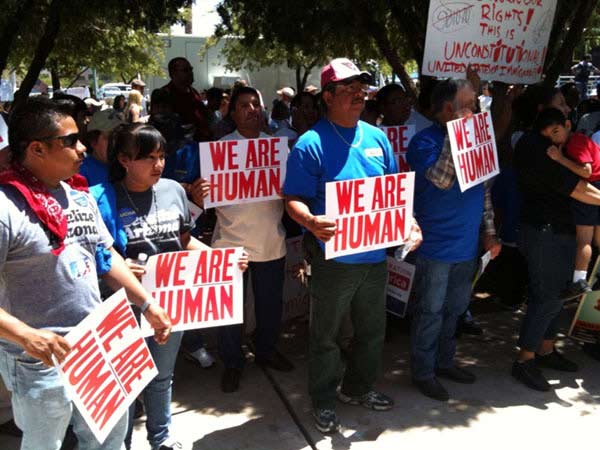 most anti-immigrant legislation in the United States, Senate Bill1070. Signed into law by Arizona Governor Jan Brewer on April 23rd, this measure allows local law enforcement authorities to question individuals based solely upon the suspicion that they may be undocumented.
most anti-immigrant legislation in the United States, Senate Bill1070. Signed into law by Arizona Governor Jan Brewer on April 23rd, this measure allows local law enforcement authorities to question individuals based solely upon the suspicion that they may be undocumented.
According to the New York Times, “The law…would make the failure to carry immigration documents a crime and give the police broad power to detain anyone suspected of being in the country illegally. Opponents have called it an open invitation for harassment and discrimination against Hispanics regardless of their citizenship status.”
President Obama stated that the law threatens “to undermine basic notions of fairness that we cherish as Americans, as well as the trust between police and our communities that is so crucial to keeping us safe.”
Guest blogged by Brooklynwala
A few days ago, a friend sent me this powerful open letter she wrote in order to spark critical thinking and dialogue on the pitfalls of calling the police and relying on the criminal (in)justice system to deal with issues in our neighborhoods and communities. We live in New York City, which has a police force widely known for its excessive use of force and violence, especially against people of color. Sundari recently did a post on the NYPD shooting and killing of a Sikh man in NYC, Satnam Singh, just last week.
In a context in which police by and large cause more harm than get us closer to justice and where the prison system dehumanizes people instead of rehabilitating them, the author of this piece, along with a growing movement around the U.S., are challenging us to think of alternative ways of responding to harm. She states,
“Many of us don’t believe in calling the police. Right now, right here, even before we’ve sufficiently built all the alternative structures for responding to harm. Both in an attempt to create the world we want to live in, and/but also because the impact of prisons and policing is brutal, oppressive, racist, traumatic. We see almost no good coming of it, certainly no transformation, no making things better. We don’t trust police, we don’t think of them as the “good guys,” and we don’t think calling them is going to change anything.”
My friend’s compelling piece “Feeling for the edge of your imagination” got me thinking about what a Sikh approach to justice is. While there is clearly not a simple answer to this question, I tend to think a Gurmukh would place love, forgiveness, rehabilitation, accountability, and recognizing the Divine in all at the center, despite questionable or even horrific actions one has perpetrated. Think about Bhai Kanhaiya Ji’s seva for “enemy” soldiers in need, who saw the injured soldiers’ humanity before he sought vengeance for their attacks against the Sikhs.
A few weeks back, while skimming through the news, I found an interesting report on Canadian Prime Minister 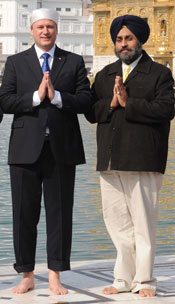 Stephen Harper’s recent visit to the Darbar Sahib in Amritsar. Although I didn’t care much for the hoopla around his visit, I did find it interesting that he “offended” Sikhs by refusing to accept parshad or langar.
Stephen Harper’s recent visit to the Darbar Sahib in Amritsar. Although I didn’t care much for the hoopla around his visit, I did find it interesting that he “offended” Sikhs by refusing to accept parshad or langar.
As I understand it, the preparation of parshad (grace) is unique in that it is ceremonially touched by a kirpan (kirpan bhet), which serves as an indication of the Guru’s acceptance and blessing. It is then distributed to 5 Amritdhari Sikhs representing the Guru Khalsa Panth. A Sikhs’ consumption of parshad displays a submission to the Guru. So accepting parshad is essentially “accepting His grace.” I’ve also been taught that parshad should be distributed after the hukamnama is read, as accepting parshad symbolizes acceptance of the hukamnama.
Now, whether or not Sikhs themselves understand the hukamnama, or even listen to it is another post for another day – but, if accepting parshad is accepting the Guru’s hukam, should a non-believer accept it? Although the Rehat Maryada states that parshad should be offered to everyone equally (as it should), should we be offended if someone rejects it? If a non-Sikh understands the meaning behind our practice and politely refuses it out of respect, shouldn’t we appreciate it instead?
I remember years ago at a Sikh Day Parade in Washington DC, as a handful of us were walking through the sidewalks handing out “Who are the Sikhs” pamphlets and answering questions from onlookers, an elderly BibiJi was darting through the crowd distributing parshad to random strangers. As shocked as I was to see this, it couldn’t compare to the shock on the face of those who received it. Most were not sure what to do with it, or joked about it with their friends, while others were seen throwing it away. I’m sure the BibiJi’s heart was in the right place, but what were we hoping to accomplish by this?
My question is…how can we value our traditions if we don’t even understand them?
And if we don’t value our traditions, how can we expect others to?
(more…)
Healthcare reform, immigration reform, banking reform, and the list goes on. This past week a diverse coalition lead by Rep. Luis Gutierrez (D-Ill) are laying down the marker in 2009 for comprehensive immigration reform by introducing the Comprehensive Immigration Reform for America’s Security and Prosperity (CIR-ASAP) Act of 2009. This bill has not been passed yet; it has only been introduced.
In a country built on the hard work of immigrants, it is imperative that this group be protected in the United States. Recently, there was a report that 1/3 of Los Angeles’s economy is dependent on immigrants. Also, immigrants are known for their entrepreneurship in small businesses. Tuyet Le, Executive Director of the Asian American Institute, says: “Family-based immigration has long created the foundation for strong, entrepreneurial communities across the country. This bill will reunite immigrants with their loved ones and will also provide some increases in high-skill temporary worker visas.”
This legislation focuses on undocumented students, family reunification, and worker visas-issues affecting our Punjabi Sikh community in America. For example, CIR-ASAP would allow undocumented high school graduates who came to the United States before the age of 16 to attain legal residency. This residency would open up educational and financial aid opportunities. This portion of the bill is modeled after the DREAM Act of 2009, except that it shortens the six-year wait period to three years and removes fines.
Many politicians in America and Canada appeal to their Sikh constituents by visiting local Gurdwaras. Sometimes these visits include a brief speech and other times just a saroopa. Regardless, it’s usually an ask for votes.
What I particularly find powerful about Canadian politicians is that they will walk along side their Sikh constituency during Nagar Kirtans and visit the Harmandir Sahib. To me that is representative of the political power the Sikh community has in Canada. Politicians are not only appearing to give a “vote for me” speech or state a “thank you” for the saropoa. They need to do more to get the Sikh vote.
Sam Grewal of the Toronto Star writes:
“The Liberal party took us for granted and is now paying the price,” Gill says. “It would be a mistake for the Conservatives to think that simply appearing at functions is enough to win votes.”
An appearance by the Prime Minister, at the place most revered by Sikhs, may be the exception.
As we head into Bandi Chod Diwas/Diwali/Deva Diwali weekend, let’s listen to President Obama’s message! I appreciate his genuine effort to wish the South Asian community a happy celebration. I’m very impressed that he said “Sikh” correctly! About time we have a US President who gets it!

My only qualm (of course I have one) is that he chose to call the entire celebration “Diwali”. Diwali is more part of the Hindu religious narrative than in Sikhi or Jainism (although culturally “Diwali” is most commonly used). Nonetheless, I’m still impressed that he knew the varying significance that “Diwali” has for different religious groups. As he connects more with members of other South Asian faiths through his various initatives, I think he will learn more about the nuances of our communities.
Wishing everyone a Happy Bandi Chod Diwas/Diwali/Deva Diwali …! Enjoy the kirtan, lights, and mithayee!
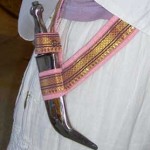 The California legislator has unanimously passed a Kirpan Education Bill (AB 504) through both houses (Assembly & Senate); it is now headed to Governor Schwarzenegger’s desk. This bill, carried by Assemblymember Warren Furutani (D-Long Beach) and other co-sponsors, will only become law if the California Governator signs off on it. AB 504 is a historic bill because it is the only piece of legislation in America that focuses on Sikhs and our kirpan. Furthermore, the bill is being pushed through the law-making process in California-a state with the oldest and largest number of Sikhs in America.
The California legislator has unanimously passed a Kirpan Education Bill (AB 504) through both houses (Assembly & Senate); it is now headed to Governor Schwarzenegger’s desk. This bill, carried by Assemblymember Warren Furutani (D-Long Beach) and other co-sponsors, will only become law if the California Governator signs off on it. AB 504 is a historic bill because it is the only piece of legislation in America that focuses on Sikhs and our kirpan. Furthermore, the bill is being pushed through the law-making process in California-a state with the oldest and largest number of Sikhs in America.
The Kirpan Education Bill (AB 504) requires that all California law enforcement officers be trained on Sikhs and our kirpan. This training would teach California law enforcement officers about Sikhs and the importance of our religiously mandated articles of faith. Sikhs wearing a kirpan are often disrespectfully approached by law enforcement officers and arrested for concealed weapons charges. Often law enforcement officers will pull Sikhs over for minor traffic violations or safety concerns and as soon as officers see the kirpan the situation is escalated into a criminal offense; although the Sikh was only practicing his/her faith. These officers are unaware that the kirpan is a religious mandated article of faith-a gift from our Guru that we wear with care, respect, and love.
Ravi Singh Bhalla was elected to the City Council in Hoboken, New Jersey this past week! A city that is less than 1% Asian and predominately white, Hobokens elected Bhalla with 5,810 votes. Bhalla had the highest number of votes amongst the 6 candidates competing for the 3 council seats.
In an e-mail out to supporters, Ravi’s brother, Amardeep Singh, described the bigotry they received during this campaign. He writes:
“… elections are not always for the faint of heart … we were cursed at constantly, literature was ripped out of our hands and stomped on, I was told by someone “I love killing Arabs”, and I was asked whether I “had a green card.”
Despite these attacks, the residents of Hoboken voted for Bhalla because he was a committed candidate who focused on the issues. Bhalla says, “It’s very humbling … it shows that people were focused on what a candidate brought to the table.”
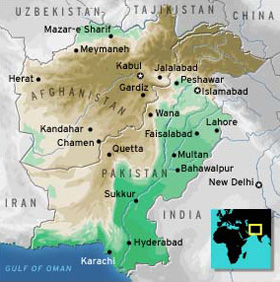 Earlier this month I asked if the Taliban’s rising influence in Pakistan and their removal of Sikhs from the Swat Valley was a harbinger for more extreme religious persecution. This week, two articles caught my eye:
Earlier this month I asked if the Taliban’s rising influence in Pakistan and their removal of Sikhs from the Swat Valley was a harbinger for more extreme religious persecution. This week, two articles caught my eye:
The first depicted multi-religious protests in Kashmir over Pakistan’s inaction in the region. The second implied complicity between the Jawat-ud-dawa (JuD) and the Taliban to use “rescue aid” as a coercive tactic.
The use of “aid” to buy sympathy, garner political favor, or build political support is nothing new, and is described extensively in Machiavelli’s The Prince [source]. Similar concerns were raised in the wake of the Indonesian tsunami, when Muslim communities alleged that Christian aid organizations were forcibly converting orphaned children and the injured by withholding necessary aid. The extent, or veracity, of those allegations was relatively unknown/unquantifiable. Given the Taliban’s extensive campaign-based strategies, in addition to the narrow regional focus of its impact, it should be less difficult to quantify the JuD’s impact.
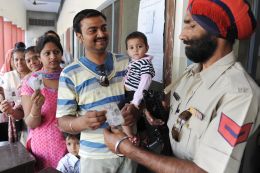 The election results in India seem to be in. The Congress Party has increased its power in the center and even some of the commenters here in The Langar Hall have been jubilant.
The election results in India seem to be in. The Congress Party has increased its power in the center and even some of the commenters here in The Langar Hall have been jubilant.
While the Indian elections have received brief commentary, here and there in The Langar Hall, the results call out for some analysis towards a Sikh perspective.
Overwhelming have been the shouts of “Singh is King” as it seems that Manmohan Singh will continue to keep the Prime Minister position, at least if his victory-speech is any indication, until his political overseers – the Gandhi family – are ready to replace the kursi-warmer with Rahul Gandhi. Others in The Langar Hall have already written critical pieces of this so-called Great Sikh Hype.
News media have rightly commented on the Congress Party’s sweeping electoral victories in Delhi on the party’s dumping of the mass-murderers Jagdish Tytler and Sajjan Kumar (albeit it seems more political maneuvering – with one of the positions filled by Sajjan Kumar’s brother, than any true remorse) and the projection of Manmohan Singh as a way to draw Sikh votes in Delhi away from BJP candidates. As a strategic community, Sikhs in no way should they tether their votes to a single party.
 At the Langar Hall, we’ve covered a number of Sikh candidates’ campaigns for local government office. I just wanted to include a brief update about Ravi Bhalla, who looks poised to become one of Hoboken’s first Sikh city councilmembers as he enters a run-off election next month:
At the Langar Hall, we’ve covered a number of Sikh candidates’ campaigns for local government office. I just wanted to include a brief update about Ravi Bhalla, who looks poised to become one of Hoboken’s first Sikh city councilmembers as he enters a run-off election next month:
While it is clear that Peter Cammarano and Dawn Zimmer will vie for the Hoboken mayoralty on June 9, the provisional ballots may still change the neck-and-neck race to see which of the last three of six council-at-large candidates get into the runoff on that date. […]
As of Tuesday night, it looked like the top six will be as follows:
[1.] Carol Marsh 3,719
[2.] Ravi Bhalla 3,698
[3.] Dave Mello 3,361 [link]
When we last covered this story, Ravi was running as an independent for office. Since then, he joined a “reform” slate and has been campaigning extensively. His success comes as a surprise to some, who don’t understand how a practicing Sikh could get so far…
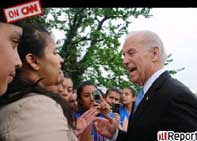
Gurbakhash Kaur Questioning Vice President Joe Biden
One of the major issues affecting the Sikh community is increasing civic engagement in the United States. We often focus on getting more Sikhs to vote and lobby our politicians about the issues affecting our community. This lobbying general pertains to writing letters and signing petitions that ask our community members to move beyond taking pictures with politicians at fundraising events or giving them awards at local melas. This past week, a young Sikh woman, Gurbakhash Kaur, highlighted what it means for a Sikh to be civically engaged. She questioned Vice President Biden “about two Sikhs in the United States Army who were told to cut their hair in order to serve” and Governor Jon Corzine about rising health education costs, while her Sikh peers stood by her side. These handshaking events were not a forum set-up for accountability, but more as photo-ops for the politicians. However, Gurbakhash Kaur was determined to make hand-shaking an opportunity to hold our elected officials accountable to their Sikh constituency.
As a resident of Lodi, New Jersey, she got face-time with Vice President Biden during his visit for a new construction project to widen Main Street and US Route 46. During her questioning, World Sikh News reports that:
Vice President Biden interrupted Kaur to tell her a member of his staff is a Sikh and did not allow her to finish her question. Afterwards, Kaur said, “I want the story to get coverage, as hardly anyone pays attention to our issues . . . we need a lot more legal support and begging and pleading to get our issues addressed.”
Ultimately, Gurbakhash Kaur’s actions are inspiring because she highlights an example of Sikh’s standing up for our rights through self-empowerment. More importantly, she acted through self-organizing rather than taking part in an event organized by other groups to mobilize the Sikh community.
Kuddos to Gurbakhash Kaur for demanding accountability from our elected officials!
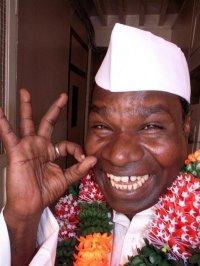
The last day of India’s 5 day, 6 week general election is tomorrow, May 13th. And only one political party has been speaking honestly about what they will do for the country post-election: Bleed India. Pappu Raj is the candidate. And select excerpts from his “moneyfesto” are as follows:
On Taxes: “Direct taxes will come Directly – to me.”
On Global Warming: “Buy A/C.”
On Heartfelt Public Health: “Run Round in Circle Act. : Run from one department to another one: Round and Round. Round and Round. This is the aerobic exercise. It gives the good muscles, improves heart and Cardio. Plus blood will flow. And we are liking your blood.”
On Jail Reform:

 For those that follow The Langar Hall, Ruby Dhalla is no stranger to our coverage on Canadian politics. Whether it be on our list of Sikh MPs throughout the world, a Sikh Barack Obama, a horrible beating that is symptomatic of the nightmare that is the Punjab Police, or even attendance at NRI Punjabi conference, she has found mention.
For those that follow The Langar Hall, Ruby Dhalla is no stranger to our coverage on Canadian politics. Whether it be on our list of Sikh MPs throughout the world, a Sikh Barack Obama, a horrible beating that is symptomatic of the nightmare that is the Punjab Police, or even attendance at NRI Punjabi conference, she has found mention.
In this post, she becomes the focus. Since last week after the Star published a story, Ruby Dhalla, the Liberal Member of Parliament, representing Brampton-Springdale, has been on the receiving end of a flood of media criticism for the following allegations
[Immigrant home care-givers] claimed that they earned $250 a week working 12- to 16-hour days at the Dhalla family home, that Dhalla herself had seized their passports and that other family members made them wash cars, shovel snow and clean chiropractic clinics owned by the family. [link]
The Canadian press has had a field day and has likened the case to the controversy that led to Eliot Spitzer’s resignation as the governor of New York due to his relationship with a prostitute after being seen as a ‘moralizer.’ Ruby Dhalla has been known to champion immigrant rights issues and women and thus it is for this reason that the allegations have been such damning.
 Next month marks the two year anniversary since the Shahadat of Bhai Kamaljit Singh. It has been quite some time since I last blogged about Dehra Sacha Sauda and unfortunately maybe I am also guilty of only following the story as the Indian media does or does not.
Next month marks the two year anniversary since the Shahadat of Bhai Kamaljit Singh. It has been quite some time since I last blogged about Dehra Sacha Sauda and unfortunately maybe I am also guilty of only following the story as the Indian media does or does not.
It was at the end of 2007, when this blog was first starting out, when I wrote about the ‘Sikh Successes of 2007’ with the incident of the confrontation of Dehra Sacha Sauda as #1 on my list. This week, I read an interesting synthesis by two French graduate students – Lionel Baixas et Charlène Simon. Lionel is completing his PhD in political science and is interested in democracy in South Asia, while Charlène is finishing her PhD in anthropology and has worked on issues related to the Ravidassia religious movement.
While I have commented on some of these issues, their recent article, titled “From Protesters to Martyrs: How to Become a ‘True’ Sikh” re-evaluates the Dehra Sacha Sauda issue through interviews and fieldwork conducted last April in Punjab and Haryana. Their abstract is as follows:
This article studies the protest which started in Punjab in May 2007 following a ceremony performed by Baba Gurmeet Ram Raheem Singh (GRRS), head of Dera Sacha Sauda, which was considered as blasphemous by a section of the Sikh community. The aim of this article is to understand the motivation of the actors of the protest itself: How did the Sikh protesters legitimate their reaction one year later? What kinds of reasons have led hundreds of Sikhs from very different social background to take the streets? What kind of emotions played a role in the Sikhs’ mobilization?
It seems like Canada is showcasing one socially conscious Sikh rapper after another. TLH has covered “Humble The Poet” and now here is “Sikh Knowledge” from Montreal. Sikh Knowledge raps with Lotus on issues effecting the 2nd generation and marginalized peoples.
Kanwar Anit Singh Saini, a.k.a. Sikh Knowledge, is the son of Punjabi Sikh immigrants. He works in the field of speech pathology where he contributes his musical knowledge to the health sciences field.
Check out his songs below and let us know what you think!
Disclaimer: There are graphic descriptions and swear words in the videos below.
On TLH we have posted on the importance of Punjabi/Khalsa Schools. I have found that despite many students’ resistance to attend these schools, they plant the seeds for future exploration into Sikhi. At the age of 12 you may think you are too cool for school on Sundays, but at 19-20 or even 30 that experience creates a base for you to delve more deeply into your spiritual identity. Thus, I think it is extremely important that each Sikh community have at least one good Punjabi/Khalsa school. Ideally, I would want each Gurdwara to have one.
However, Punjabi/Khalsa Schools run into problems because in some way or another they become linked with communal politics. Most often this politics infiltrates schools within Gurdwaras. I think a fundamental component of a Gurdwara is a Punjabi/Khalsa School as is a Langar Hall. However, for many Gurdwaras, Punjabi/Khalsa Schools are a last priority. Gurdwara committees will fund new kitchen appliances before making a commitment to continually fund a Punjabi/Khalsa School. Thus, some community members have decided to create Punjabi/Khalsa Schools outside of the Gurdwara in local community-centers. When I hear this, I am both excited and disappointed. Excited that a school has been established; but disappointed that we are showing Sikh youth that we have to step outside of our main institution, the Gurdwara. How are we supposed to socialize our children into a Gurdwara-going culture when our leadership doesn’t support it in action? It’s a Catch 22. I don’t blame community members for creating schools outside of the Gurdwara. Their circumstances are real and, many times, this is their only feasible option. Or is it?
Today, I want to share with you, Nirpreet Kaur’s story. I highlight her story for 2 reasons. 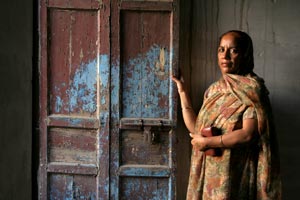
First, as we’ve discussed on this blog before, the majority of Sikh history as its been documented thus far really is his-tory. So this piece of her-story is a rare gem. And second, too often, we think of women in the Sikh community only in our roles as mothers, sisters, wives, and daughters. These are all important roles but our identity isn’t entirely defined relative to others’ or based on our relationships with others. Yet we recognize the additional roles we play outside of these expected roles too rarely. And so… Nirpreet Kaur.
Nirpreet was 16 years old on November 2, 1984 when the mob came for her father, Nirmal Singh…”[Khokhar- a Youth Congress leader] sweet-talked my father into coming with him for a compromise,” says Nirpreet. But Khokhar went straight to the mob and handed Nirmal Singh over. The oldest of three siblings, Nirpreet, ran to the mob but could only watch helplessly as her father was tied up and set ablaze. [link]
To avenge the killing of her father, Nirpreet joined the Khalistani movement.
As a functionary of the then dreaded All India Sikh Students Federation, Nirpreet came in contact with those involved with the Khalistan movement, an armed insurgency fighting for an independent Sikh homeland in Punjab, and became part of the militancy that ravaged the state for over a decade in the 1980s.[link]
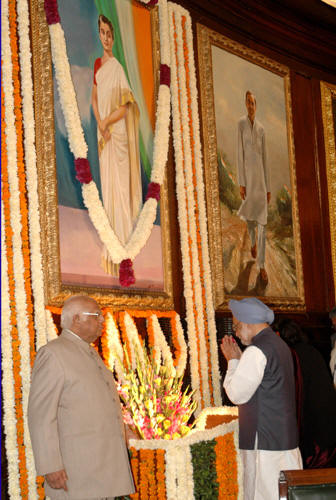 I remember that night…election night, watching on TV students rejoicing in the streets outside of Howard University (a local Historically Black University). I’m not sure how much of it was about Obama’s policy, or just the “historic” nature of the event, but it was all summed up to me as an African-American student holding back his tears said to a reporter, “I’m just so happy to have one of our guys in power.” It was a common sentiment, but this statement stuck in my head for several days. What did he mean by this? What was his expectation of President Obama over the next 4 years? Did he think just because a black man is in office, all of a sudden the American experience will now change for black people? That the wrongs of their history will now become right? That discriminatory laws and policies toward black people will all of a sudden be overturned? If that is what he meant, then I understand the celebration…but I would celebrate with caution.
I remember that night…election night, watching on TV students rejoicing in the streets outside of Howard University (a local Historically Black University). I’m not sure how much of it was about Obama’s policy, or just the “historic” nature of the event, but it was all summed up to me as an African-American student holding back his tears said to a reporter, “I’m just so happy to have one of our guys in power.” It was a common sentiment, but this statement stuck in my head for several days. What did he mean by this? What was his expectation of President Obama over the next 4 years? Did he think just because a black man is in office, all of a sudden the American experience will now change for black people? That the wrongs of their history will now become right? That discriminatory laws and policies toward black people will all of a sudden be overturned? If that is what he meant, then I understand the celebration…but I would celebrate with caution.
Five years ago, many Sikhs were celebrating in the streets as well. Finally, one of “our guys” had become Prime Minister. Manmohan Singh was elected selected as the 17th Prime Minister of India, by Sonia Gandhi herself. Sikhs all over the world rejoiced. Even many of the Sikh political prisoners in jail were celebrating with this victory, believing their release was now imminent.
Even some of my more progressive and panthic-minded friends got caught up in “Manmohan Singh Fever” and encouraged me to give him the benefit of the doubt. After all, how could we judge him? Who knows what he may do for us?
I, however, remained skeptical.
As we remember 1984 through concerts and acts of rebellion, let’s not forget the visceral spirit displayed by Singhs IN that time period.
Watch below the original version of a Punjabi kavita sung by Bhai Gursharan Singh during those turbulent times in Manji Sahib Hall located in the Darbar Sahib complex . This kavita captures the mood and spirit of those days. Tigerstyle later used it in one of their Shaheedi CDs to REMEMBER that spirit.
Intellectually, we can try to REMEMBER those days; but this kavita actually makes us FEEL how it was to live through that time.

